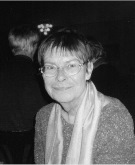 Barbara Antkowiak (*1933 in Berlin, †2004 in Berlin)
Barbara Antkowiak (*1933 in Berlin, †2004 in Berlin)
Barabara Antkowiak would probably never have thought that one day she would be one of the most important translators of Serbo-Croatian literature. She started studying Slavic languages and literatures in Leipzig and learned Czech, Bulgarian, Russian and Polish. Serbo-Croatian she learned after her studies with a lot of enthusiasm. In the second half of the 20th century Barbara Antkowiak was one of the most commendable mediators for literature from countries of the former Socialist Federal Republic of Yugoslavia.
Barbara Antkowiak was employed in the most important publishing house for international literature in East Germany “Volk und Welt”. Her main interest was the current literature from Yugoslavia and Bulgaria and she decided to translate it by herself. One of her first translations was the children’s book “Vlak u snijegu” (Der Zug im Schnee, 1959) from the Croatian writer Mato Lovrak. With the translations of “Lelejska gora” (Der Berg der Klagen, 1967) and “Svadba” (Die Hochzeit, 1972) from Mihajlo Lalić she orientated her choice by the publishing house’s program of anti-Fascist literature. Barbara Antkowiak dared to translate works from the most famous Yugoslavian writers as Meša Selimović, Miloš Crnjanski and Miroslav Krleža. The latter was one of her favorite. Her other favorite writer was the Serb Aleksandar Tišma. Tima accepted only her as translator for his books.
Barbara Antkowiak enjoyed to meet authors and to discuss the translations with them. Such encounters were an appreciated alternation to the technical and manual work, as she named it once, of a translator. Friends described her as a workaholic who didn’t went easy on herself. One trick to train her language skills was filling out cross words in Croatian, Bosnian and Serbian newsletters.
In 1990 the publishing house “Volk und Welt” was sold and Barbara Antkowiak by the age of 57 forced in early retirement. Moreover the war broke out and led to the disappearance of the country Yugoslavia and the language Serbo-Croatian from the mental map of Europe. Henceforward Barbara Antkowiak referred to the language with “naški” (our language) and avoided to call the common language by its new national successors (Croatian, Bosnian, Serbian). The nineties were “her horrible decade”. Nevertheless, her early retirement had also a positive effect for a lot of writers: she worked a lot on translations of Bora Ćosić, Dževad Karahasan, Nenad Veličković and Dubravka Ugešić, who were critical voices regarding the outcomes of the war and who are still very productive and most important writers from the region. Beneath that she scouted some young writers and talents like Juliana Matanović and Biljana Srbljanović. Bora Ćosić described her immense achievement in his Laudatio for the Leipziger Buchpreis zur Europäischen Verständigung with following words: “We are celebrating a service on civilization and culture.”
by Maja Konstantinović and Vivian Kellenberger
Read more.
Relying on the structure and methodology of classical and postclassical [...]
For further information on translation, the TransStar project and the [...]
Relying on the structure and methodology of classical and postclassical [...]
Sir or Madam, In co-operation with KulturKontakt Austria, the Austrian [...]
Five short films with translations (videopoetry) were made as part [...]
Translating Cube: Six Sides of European Literature and Translation Berlin, [...]
Programme (PDF)
Five short films with translations (videopoetry) were made as part [...]
Translating Cube: Six Sides of European Literature and Translation Berlin, [...]
Programme (PDF)
Translating Cube in Tübingen Reinold Hermanns: SWR2 Journal am Mittag, [...]
Being Exchanged: Between Paris, Stuttgart and Ivano-Frankivsk Yuri Andrukhovytsh, Lubomír [...]
Five short films with translations (videopoetry) were made as part [...]
Bookstore: http://www.edition-fototapeta.eu/geschichten-erzaehlen
More here (PDF). Bookstore: https://knjigarna.ff.uni-lj.si/si/izdelek/1623/pet-poti-do-prevoda/
Five short films with translations (videopoetry) were made as part [...]
Bookstore: http://www.edition-fototapeta.eu/geschichten-erzaehlen
More here (PDF). Bookstore: https://knjigarna.ff.uni-lj.si/si/izdelek/1623/pet-poti-do-prevoda/
Translating Cube: Six Sides of European Literature and Translation Berlin, [...]
Programme (PDF)


